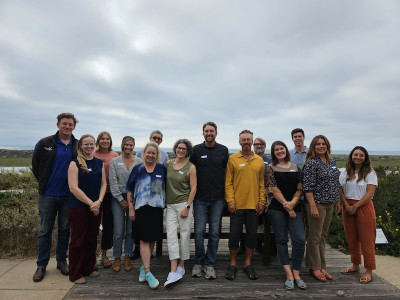Across the globe, no food sector is growing as fast as aquaculture — which means, one way or another, farmed seafood will help feed the world’s growing population. Currently, though, the United States accounts for less than 1% of global aquaculture production. One contributor to the holdup is the skepticism of environmental groups concerned over potential negative environmental impacts.
“Aquaculture is one of those things where, when somebody hears the word, they have an idea of it — but it’s a quick snapshot, a black-and-white idea,” says Erica Donnelly-Greenan. The executive director of the nonprofit Save Our Shores partnered with California Sea Grant and Moss Landing Marine Laboratories last summer to host the “California NGO Responsible Aquaculture Forum.” This August, the partners released a report that summarizes the views shared at the forum.
The event gathered participants from several California nonprofits “to get perspectives — a check of the temperature in the room,” says Donnelly-Greenan. Accordingly, the report does not aim to supply a consensus but instead reflects the concerns and hopes expressed.

Thirteen professionals, affiliated with 12 organizations focused on conservation in California, participated. (Participants spoke for themselves, though, not necessarily as official representatives of their nonprofits). The group was diverse, including members of both organizations that support developing aquaculture and organizations that watch it guardedly, tracking the potential environmental impacts of aquaculture activities. To encourage deep conversation, the participants engaged in “scenario planning exercises,” providing feedback on hypothetical aquaculture projects.
“When a lot of people think about aquaculture, they go straight to ‘yes’ or ‘no’ — ‘I like it’ or ‘I don’t,’” says Luke Gardner, a California Sea Grant extension specialist based at Moss Landing Marine Laboratories who served as an aquaculture expert at the forum. Ava Salmi, a California Sea Grant staff research associate based at MLML, also served as an expert to help facilitate discussions around scenarios. In particular, some participants said they were opposed to open-water net pen finfish aquaculture, due to perceived difficulties in preventing fish waste from impacting surrounding environments among other potential impacts. So, working with Donnelly-Greenan, Gardner and Salmi developed hypothetical scenarios that looked at more nuanced cases: How might land-based recirculating aquaculture systems for finfish farming be managed? What about farming seaweed? How might we evaluate an Indigenous-led aquaculture operation that aims to conserve ecosystems?
“It’s important that we get into conversations that are deeper and broader,” Gardner says.
As the climate changes, the stakes are high; some participants saw aquaculture as a way to build economic resilience in coastal communities, and to further conservation, while others worried that unsustainable practices might simply exacerbate the impacts of a warmer atmosphere. Several participants expressed their desire that local communities have input on regulations, notes Donnelly-Greenan. There were worries, too, that the regulations do not properly account for how multiple projects could add up to cause bigger effects over time, or that aquaculture activities might be permitted close to marine protected areas. However, participants also felt that permitting and monitoring should be made more efficient by creating a more cohesive regulatory framework.
Donnelly-Greenan, a marine ecologist and the former Executive Director of Save Our Shores sees the forum as a first step. “We’ve got to keep the conversation going,” she says, noting that it’s especially important to keep smaller nonprofits, and Indigenous-led nonprofits, included. “It’s too easy to say, ‘If it isn’t perfect, we aren’t going to do it.’ We have to adapt and evolve with climate change, which means new food systems. We have a chance to develop aquaculture in a way that doesn’t replicate the mistakes we’ve made in other food systems, but only if we engage in these conversations.”
Read the executive summary from the forum here: